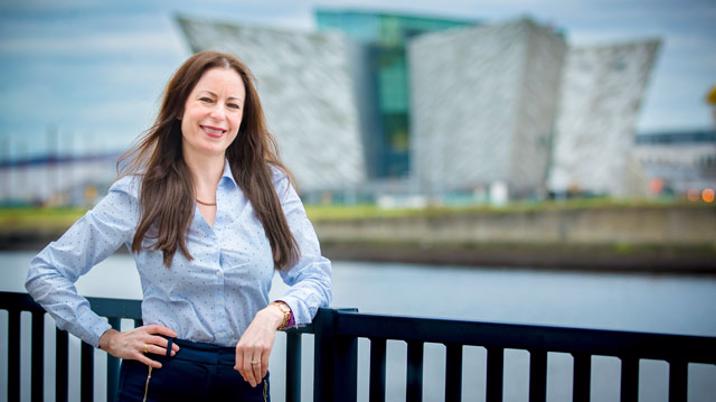
When Gail Walker, the first woman editor of the Belfast Telegraph, Northern Ireland’s largest daily, reaches for a mantra to explain what she does, she chooses former Washington Post columnist David Broder.
Broder, she notes, argued that the newspaper that drops on your doorstep “is a partial, hasty, incomplete, inevitably somewhat flawed and inaccurate rendering of some of the things we have heard in the past 24 hours.”
Walker continues the quote, which she deployed at the recent IPSO Road Show in Belfast: “If we labelled the product accurately, then we would immediately add: but it’s the best we could do in the circumstances.”
For Walker, it “sums it all up really” and she was pleased to see it also impressed Sir Alan Moses, chairman of IPSO, who noted it down and will likely use it in future speeches.
Walker was appearing alongside Northern Ireland’s other two daily editors, Noel Doran, editor of the Irish News, the paper largely representing the Catholic and nationalist community and Alistair Bushe, editor of the mainly Protestant and Unionist News Letter.
The Belfast Telegraph, historically an evening now a morning paper, is aimed at the entire community in a divided society and sees itself as a unionist paper but “with a small u” acting as a bridge in what people in the province like to talk about as a new post-Troubles Northern Ireland.
Walker, who is in her “mid-40s”, has spent her entire journalistic career on the paper that dropped through her parent’s letterbox as a child.
Appealing to the entire community, she explains, involves “a thousand little calibrations a day to get that mix just right.”
It also involves offering space to Northern Ireland’s squabbling politicians from the DUP leader Arlene Foster who holds the balance of power at Westminster, to the Sinn Féin leader in Northern Ireland, Michelle O’Neill who would never attend the place.
“We are a very broad newspaper, very fair. We really are holding up a mirror to the community we live in. We give people the full picture of life here though that doesn’t necessarily mean to say people always like everything they see,” explains Walker who spent years as a hard news reporter, including covering the Troubles.
She sees it as an advantage that readers of the Belfast Telegraph are not all of one religion or political persuasion.
“We are not always speaking to people who think like us. I like to think of it as speaking to people who think like themselves,” adds Walker.
Readership research shows that 60 per cent of Belfast Telegraph readers are Protestant, 29 per cent are Catholic and 11 per cent are neither, or have no religion.
In addition to the thoughts of David Broder, Walker has a more local mantra of her own.
“Northern Ireland is still emerging out of conflict and I like to think that the Belfast Telegraph is at the centre of that debate, the centre of both communities, or the collective one community, in trying to steer a path through all of that,” she explains.
Walker started summer holiday working on her local paper, the Lurgan Mail, when she was sixteen and after graduation, spent six months on what was then the Thomson regional training scheme on the Sunday Sun and the Evening Chronicle in Newcastle.
Then and now
Then it was into the deep end – stories such as being sent to doorstep the families of two young women who had been shot dead overnight and getting her interviews in on time.
The Troubles, she admits, were frightening and exhilarating at the same time but became just part of daily life.
“In a sense, we were living in the eye of the storm, death, bombing, mayhem. I was covering all of these things,” says Walker who believes it would be absurd to say journalists were not affected by what they saw.
“It would be wrong to say that the dead don’t come back to haunt journalists, of course they do because people are human,” she emphasises.
And not nearly as cynical as many think. She remembers not just the aftermath of bomb explosions but also small acts of kindness, such as a photographer trying to comfort a bewildered child whose father had just been murdered.
“I do think that journalists are a kind of repository of communal memories and ghosts because they were there and they witnessed,” says Walker who has won awards for her news and features and still writes a column for her paper.
In the Northern Ireland of today, the battles are very different – against the social media and falling paper sales – but the fundamentals remain.
Walker believes that there will continue to be an important role for news that is collated, curated and verified.
“In real terms, the news industry is flourishing and so too is the awareness that people need to be careful about what news they subscribe to, what is actually to be trusted,” said the Belfast Telegraph editor.
“They know when they pay £1 for our newspaper, they know what they are getting,” added Walker who commented at the IPSO Road Show that, sometimes, going onto social media was like “putting your hand in an open sewer”.
She is of course trolled, including the usual abuse about her gender and how she appears, but she says she has faced “not one iota” of discrimination as a female editor in what can still be a traditional male-orientated society.
“I am the first female editor of the Belfast Telegraph. That’s a fact and I suppose it’s a bit of a landmark but no more than a fact. The paper I put out is driven by news rather than anything else,” she explains.
In the six months to June this year, the Belfast Telegraph sold 39,314 copies, 52 per cent of them in the greater Belfast area, the rest throughout Northern Ireland. Fifteen years ago, circulation was more than 100,000.
Walker fears that sales of the Belfast Telegraph, owned by what was Sir Anthony O’Reilly’s Independent News and Media, could come under further pressure after two price rises in a year to £1.
Something magical
Despite everything, she remains optimistic about print.
“I get angry at times when people say print is a dying medium. It’s still here, it’s still an essential part of people’s daily lives. I think there is something magical about a physical newspaper – people say that information on the internet washes over them,” Walker notes.
Never mind magical, she believes sometimes it’s a miracle what they manage to produce given the pressure on resources – around 40 staff journalists across print, digital and sister paper Sunday Life. The numbers are however boosted by a wide range of freelance contributors.
Walker believes in recruiting from as wide a range of backgrounds as possible.
“The thing I really like about journalists is that you meet all sorts of people, even among the young – the studious, the thoughtful, shy people, some people larger than life and all the shades in between, good guys and bad guys and somewhere in all of that, you can build a team,” says Walker.
Apart from covering the news – and she has increased the emphasis on news - the Belfast Telegraph team has two large running stories – Brexit and the apparently endless deadlock in trying to create a new power-sharing government for the province.
Although Northern Ireland voted ‘remain’, many fear it could be one of the worst sufferers from the effects of leaving the EU – with perhaps a return to the bad old days of smuggling cattle and many other things across the border.
For Walker, Brexit touches a lot of the old ley lines such as the border.
If, in future, cattle smuggling were to resume, she wants to read about it first in the Belfast Telegraph.
“I don’t just want the first pictures of the cows being driven across the border but the first quote from the cows as well,” she laughs.
The long-running story of the lack of agreement on a power-sharing government is causing great frustration, and everything from trying to reduce hospital waiting lists to infrastructure improvement is effectively put on hold while jobs are lost.
People complain, Walker explains, but then when an election is called, they retreat to their traditional camps and vote for the same people again.
“The middle ground is disappearing and it’s very difficult to rebuild out of that. People must realise this is a shared space and the truth is the rest of the world is utterly bored (with Northern Ireland). There is a new form of terrorism in the world now and people are much more focused on that,” she argues.
After nearly three years as editor, what does Walker want to achieve in the future?
“I just want to keep on producing a newspaper that has a news agenda that is bright and engaging, a mirror of society that people feel when they go into a shop and see it, they want to pick it up and read it,” she says.
And before long there will be some personal news involving Walker – she will get married for the first time, to Damian Smyth, head of drama and literature at the Arts Council of Northern Ireland.
It will be very much a family affair and it’s far from clear whether a picture will appear in the Belfast Telegraph.
“I’m not sure my readers would be all that interested. I think the paper should speak for itself and that editors are people who should stay behind the scenes,” says Gail Walker who rarely gives interviews.










